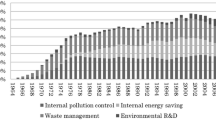Abstract
Environmental protection and economic growth seem to be two contradictory concepts. Exploiting natural resources in order to improve living standards, according to some observers, will inevitably cause environmental damage, which, ironically, would eventually threaten our health and even our survival. On the other hand, policies aiming to reduce pollution and improve efficiency may drive up the costs for economic growth and therefore discourage industrial competitiveness in international markets.
Access this chapter
Tax calculation will be finalised at checkout
Purchases are for personal use only
Preview
Unable to display preview. Download preview PDF.
Similar content being viewed by others
Bibliography
Beckerman, Wilfred. 1992. “Economic Growth and the Environment: Whose Growth? Whose Environment?” World Development 20(1) (April): 481–496.
Cao, Xin. 2004.“Study on the Relationship of Economic Development and Environmental Protection [jingjifazhan yu huanjingbaohu guanxi yanjiu].” Social Science Journal [shehui kexue jikan] 2: 60–64.
Georgescu-Roegen, Nicholas. 1971. The Entropy Law and the Economic Process. Cambridge: Harvard University Press.
Grossman, Gene and Alan Krueger.1995. “Economic Growth and the Environment.” The Quarterly Journal of Economics 110(2): 353–377.
Holdren, John and Paul Ehrlich. 1971. “Overpopulation and the Potential for Ecocide.” In Holdren and Ehrlich (eds.) Global Ecology. New York: Harcourt Brace Jovanovich, pp. 64–78.
Jansson, Annmari, Hammer Monica, Folke Carl and Costanza Robert. (eds.). 1994. Investing in Natural Capital—The Ecological Economics Approach to Sustainability. Washington, D.C.: Island Press.
Klevorick, Alvin K. 1996. “The Race to the Bottom in a Federal System: Lessons from the World of Trade Policy.” Yale Law and Policy Review 14(2): 177–186.
Meadows, Donella, Dennis Meadows, Jorgen Randers and William Behrens III. 1972. Limits to Growth. New York: New American Library.
Pi, Jiancai. 2010. “Environmental Protection and Economic Development in the Chinese Decentralized System [zhongguoshi fenquanxia de huanjingbaohu yu jingjifazhan].” Research on Financial and Economic Issues [caijing wenti yanjiu] 6: 10–14.
Porter, Michael E. 1995. “Toward a New Conception of the Environment-Competitiveness Relationship.” Journal of Economic Perspectives 9(4): 97–118.
Qi, Ye and Lingyun Zhang. 2007. “The Applicability of ‘Green GDP’ in Officials’ Assessment [‘luse GDP’ zai ganbukaohe zhong de shiyongxing fenxi].” Chinese Public Administration [zhongguo xingzhengguanli] 12: 26–30.
Schumpeter, Joseph. 1934. The Theory of Economic Development: An Inquiry into Profits, Capital, Credit, Interest, and the Business Cycle. Cambridge: Harvard University Press.
Shanxi Department of Environmental Protection. 2009. “Blue Sky Clean Water Project in Three Years [bishuilantian sannian jian” Environmental Protection.[huanjing biaohu] 11: 1–25.
Shanxi Province—Department of Environmental Protection. 2010. Communique of Shanxi on the 2009 Environmental Quality. http://www.sxhb.gov.cn/news.do? action=info&id=24769
Shanxi Province—Shanxi Statistical Information Website. 2010. Statistical Communiqués of Shanxi Province, 2005 to 2009. Shanxi Economic and Social Development. http://www.stats-sx.gov.cn/html/2010–3/2010310163817172385702.html
Sun, Changxue. 2006. “Governmental Action and Sustainable Development of Resource and Environment [zhengfuzuowei yu ziyuanhuanjing kechixu fazhan].” Reform of Economic System [jingji tizhi gaige] 1: 31–34.
Wang, Yuming. 2008. “The Practice and Improvement of Leaders Environmental Protection Evaluation System [guangdong lingdaoganbu huanjingbaohu shiji kaohezhidu de shijianyujiqi wanshan].” Journal of Guangdong Institute of Public Administration [guangdong xingzhengxueyuan xuebao]. 2: 21–25.
Xing, Xiufeng and Yingyu Liu. 2006. “Measurement and Analysis of the Relationship between Economic Development and Environmental Protection of Shandong Province [shandongsheng jingjifazhan yu huanjingbaohu guanxi de jil-iangfenxi].” China Population Resources and Environment [zhongguo renkou ziyuan yu huanjing] 1: 58–61.
Xiong, Peng. 2005. “Environmental Protection and Economic Development: The Controversy between Porter Hypothesis and Traditional Neo Classical Economics [huanjingbaohu yu jingjifazhan-ping botejiashuo yu chuantongxingudian jingjixue zhizheng].” Contemporary Economic Management [dangdai jingjiguanli] 5: 80–84.
Zhang, Hongfeng and Feng Zhou. 2009. “Research of Regulation Performance of the Mutual Empowerment of Environmental Protection and Economic Development [huanjingbaohu yu jingjifazhan shuangying de guizhijixiao shizhengfenxi].” Economic Research [jingji yanjiu] 3: 14–26.
Zhang, Lingyun and Ye Qi. 2010. “Explaining Local Environmental Regulation Dilemma: Hypothesis of Political Incentives and Financial Restraints [difang huan-jingjianguan kunjing jieshi-zhengzhijili yu caizhengyueshu jiashuo].” Chinese Public Administration [zhongguo xingzhengguanli] 3: 93–97.
Zhang, Man. 2001. “A Strategy for Economic Growth and Environmental protection to Coexist [jingji fanzh yu huanjingbaohu de gongsheng guanxi].” Research on Financial and Economic Issues [caijing wenti yanjiu] 5: 74–80.
Zhou, Jingkun. 2009. “Performance Management System of Party and Government Leaders in Environment Protection Based on the Local Government Environmental Protection Strategy Objectives [jiyu difangzhengfu huanjingbaohu zhanlue guihua de dangzhenglingdao huanbaojixiao guanlitixi yanjiu].” PhD diss. Donghua University.
Editor information
Copyright information
© 2013 Bingqiang Ren and Huisheng Shou
About this chapter
Cite this chapter
Chen, J. (2013). Incentive Structures and Compatible Development in a Chinese Local State. In: Ren, B., Shou, H. (eds) Chinese Environmental Governance. Environmental Politics and Theory. Palgrave Macmillan, New York. https://doi.org/10.1057/9781137343680_4
Download citation
DOI: https://doi.org/10.1057/9781137343680_4
Publisher Name: Palgrave Macmillan, New York
Print ISBN: 978-1-349-46853-9
Online ISBN: 978-1-137-34368-0
eBook Packages: Palgrave Political & Intern. Studies CollectionPolitical Science and International Studies (R0)




